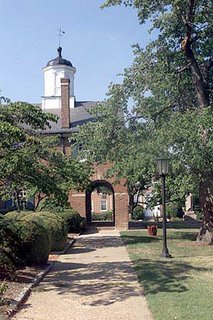Solitude and Hope: Y'all Come Visit!
Publick and Privat Curiosities: Articles Related to News, Politics, Society, Gay Issues, Psychology, Humor, Music and Videos.April 03, 2006
George Mason University: Still America's "Cinderella"

Back before George Mason University’s basketball team was two wins away from a national championship, the school had a different set of all-stars: its economics department.
It counts two Nobel laureates and is a groundbreaker in research into how changing incentives affect people’s behavior.
But perhaps the two sets of stars have something to learn from each other.
Basketball, as it turns out, makes an intriguing laboratory for testing economic theories against how things work in the real world — a specialty of George Mason’s economists.
The Washington Post called some of George Mason’s other big men to ask how they might apply their pet areas of research to examining their team’s recent success. In case you have trouble keeping them straight: Economists have game theory; the basketball players have just got game.
There’s another big difference. “I don’t remember anywhere near this big a celebration when Vernon won the Nobel Prize,” said GMU economics professor Alex Tabarrok, referring to colleague Vernon L. Smith, who shared the $1 million prize in 2002.
George Mason’s economics department was put on the map by its other Nobel winner, James Buchanan, who broke ground in using economic tools to analyze political decision making and the impact of laws on society. It’s called public choice theory, and its lessons are particularly useful for the basketball court.
Think of a basketball game as a vastly simplified proxy for the real world. There are laws that govern behavior (the rulebook), people who enforce those laws (referees), and a way to measure who is succeeding and who isn’t (the score).
Just as lawmakers can change the way wealth is distributed by changing tax and other rules, changes to the rules of basketball can have sometimes unpredictable effects on what teams score the most, and how.
Peter Boettke, a George Mason economist and avid basketball fan, offers an outlandish example: “I can change one rule in basketball and Michael Jordan will no longer be the best basketball player of all time. You could change the rules to require the game be played on stiletto heels. Then Cindy Crawford would be the best player.”
He and a student are beginning research that would use economic techniques to examine what he suspects are myths.
For example, some sports commentators argue that contemporary basketball players are weaker shooters than their predecessors, who had better fundamental skills. Boettke plans to examine whether the the three-point line is the actual reason for apparently weaker shooting percentages.
After all, awarding an extra point for more distant shots creates an incentive for players to shoot from farther away than they used to, which produces lower shooting averages.
If his research into basketball yields any interesting conclusions, he said he may slip them to GMU Coach Jim Larranaga before publishing them — after all, the coach is more likely to find some use for them. “All we egghead academics do is sit back and ask, ’What are the rational choice mechanics of all of this’ and try to have fun with it,” Boettke said.
He figures that George Mason’s recent success has to do with the incentives facing the very best young basketball prospects.
Elite players commonly drop out of college to join the NBA early, so the advantage enjoyed by top college programs able to recruit them is smaller than it was. What is at work may be a version of what game theorists call “prisoner’s dilemma.”
Elite players may have more incentive to position themselves to be hot NBA prospects than to do the things — passing the ball, for example, instead of shooting — that would make their teams more successful. George Mason’s players, who have been long-shot professional basketball prospects, may have fewer competing incentives and might therefore be more inclined to work as a team.
Neil Irwin
The Washington Post
April 02, 2006
Archives
January 2005 February 2005 March 2005 April 2005 May 2005 June 2005 July 2005 August 2005 September 2005 October 2005 November 2005 December 2005 January 2006 February 2006 March 2006 April 2006 May 2006 June 2006 July 2006 August 2006 October 2006 November 2006 December 2006 January 2007
Subscribe to Comments [Atom]